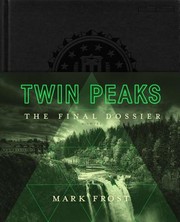nicknicknicknick@bookwyrm.social reviewed Twin Peaks: The Final Dossier by Mark Frost (Twin Peaks, #2)
Not a *good* book but i *liked* it
4 stars
1) [Albert Rosenfield, on Leo Johnson] "My own interaction with this knuckle-dragger was fleeting, but he left a vivid impression, not unlike the livid marks on his soon-to-be ex-wife’s neck after he nearly strangled her. His entire life span could easily be written off as a scathing indictment of our public education system, but to be fair, you’d probably have to go all the way back to the crossroads where Cro-Magnon and Neanderthal went their separate ways and say: Leo’s forbears took the path less traveled.
So, for starters: It wasn’t the spiders that killed him. Whatever 'evil genius'–I’m looking at you, Windom Earle–decided to hoist a bag of tarantulas over his head as a dire threat to Leo’s health obviously wasted far too much time watching cheesy Vincent Price movies and not nearly enough studying arachnids. Tarantulas aren’t ever fatally venomous, dipshit; they just look scary.
[...] …
1) [Albert Rosenfield, on Leo Johnson] "My own interaction with this knuckle-dragger was fleeting, but he left a vivid impression, not unlike the livid marks on his soon-to-be ex-wife’s neck after he nearly strangled her. His entire life span could easily be written off as a scathing indictment of our public education system, but to be fair, you’d probably have to go all the way back to the crossroads where Cro-Magnon and Neanderthal went their separate ways and say: Leo’s forbears took the path less traveled.
So, for starters: It wasn’t the spiders that killed him. Whatever 'evil genius'–I’m looking at you, Windom Earle–decided to hoist a bag of tarantulas over his head as a dire threat to Leo’s health obviously wasted far too much time watching cheesy Vincent Price movies and not nearly enough studying arachnids. Tarantulas aren’t ever fatally venomous, dipshit; they just look scary.
[...] The world is changing pronto, Chief, and now that these salt-of-the-earth “country volk” realize they’ve been left behind, it’s going to be sheer hell playing catch-up. (I know, I know, I’m a raging asshole.)
And speaking of entrepreneurial initiative, here’s a no-brainer: Why don’t some of these enterprising yokels kick-start a craft brewery here in town? They’d instantly attract an endless stream of thirsty proles, and the only competition is swill.
Enough community building for one night. To sum up: Leo Johnson’s dead. Having a hard time arguing that the local landscape isn’t trending upward because of it."
2) "The level of Cooper’s suffering and remorse in the terrible aftermath of these tragic events can’t be underestimated. He fiercely committed himself to counseling and self-reflection during his physical recovery in a way that was 100 percent sincere. He’s on record—well, tape, anyway—confirming that this experience represented the most difficult lesson of his life, and, admirably, he took it to heart. But that’s not quite the same thing as entirely purging an ingrained impulse to save a troubled woman from herself, is it, Chief? (Am I being too harsh on Agent Cooper here? I’m open to suggestions, so please let me know if you feel that’s the case. Notwithstanding its importance, I believe Cooper’s obsession with the Laura Palmer case harbors echoes of this tendency.)"
3) "James had edged past thirty, and at this point the bloom faded permanently from his Kerouac romance with the road. Once his leg healed up, he went back to work for Ed at the Gas Farm, and a few years later he took a second job working night security at the Great Northern. He lives alone, modestly, drives a used Ford Focus now, still plays guitar, writes plaintive, simple, and appealing songs—unrequited love, heartbreak, and so on—that he sometimes performs locally, and as far as I can tell has never hurt another human being."
4) [Margaret Lanterman, read aloud at her funeral] "Every meeting between friends must end with a parting, and so, my friends, today we take our leave. This is life. None of us profits from ignoring or hiding from the facts, so why should we bother? Life is what it is, a gift that is given to us for a time—like a library book—that must eventually be returned. How should we treat this book? If we are able to remember that it is not ours to begin with—one that we’re entrusted with, to care for, to study and learn from—perhaps it would change the way we treat it while it’s in our possession. How do you treat a precious gift from a dear friend? This is a good question to ask, and today is a good time to ask it.
Such busy, busy minds we have. Have you noticed? We think and we think until we twist ourselves into the ground like a flathead screw. My log has this to say: The answers to all our questions are in the wind and the trees, the rocks and the water.
No one is helpless. No one is beyond helping. It is good to seek out those who need us and do what we can for them. I recommend that. There is nothing that can’t be done if we set our minds to doing it. Don’t be sad. Be happy you have another day to do what needs doing. We only have so many of them.
We are born into this world, not another one. It’s not perfect, but it is what it is. This world presents some simple, certain truths. It helps us grow if we accept them, but many of these truths seem to trouble or frighten us. For instance, there is no light without darkness—and this troubles many of us—but without it, how else would we tell one from the other? We spend half of every day in darkness; surely we should make our peace with this. You may decide to see this as a metaphor. Many people do. I see it as a fact. Metaphors are beautiful ways of speaking about the truth. So are facts. Both tell us that time—and light, and darkness—moves in cycles. We move through them, too, often as passengers, but if our eyes are open, there is much to be learned along the way. A traveler learns more than a passenger. When darkness comes, a traveler learns to be brave, for they know the light will return. Anyone who’s spent a night alone in the woods learns this. When a dark age comes, hold the light inside. That’s where it lives anyway. There are forces of darkness—and beings of darkness—and they are real and have always been around us. They’re part of the dance, just as you and I are; they’re just listening to different music. This may be the most troubling truth we will ever know. Many of us live most of our lives and brush up against this reality only rarely. It is far from pleasant, but wishing it were otherwise will not make it so.
So may I offer a suggestion: When a dark age comes, just as you would at night, hold the light inside you. Others, I can tell you, have already learned to do the same. In time, you will learn to recognize the light, in yourself and others. In this way you will find each other. Together, you will make the light stronger.
This truth I know as sure as the dawn: Darkness will always yield to light, when the light is strong."
5) "I’m on the plane now, in the air, forty minutes east of Spokane. The uncanny penumbra I reported hasn’t left me—I barely slept—but it’s fading as I travel farther east. I don’t know what to make of it. You wanted to know what happened there in that town and region, to these people you knew, whom I feel I’ve come to know now as well. They meant something to you for a reason, I think, beyond just your knowing them, beyond that they were good or interesting people in their own right: because it was all there, in that one town. All of life, cradle to grave, every shade and color of the spectrum, like a fractal, itself made up of infinite parts. The ocean in a drop of water."

